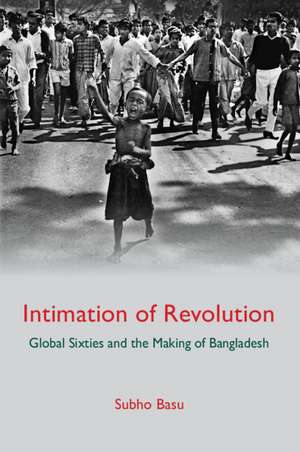Intimation of Revolution: Global Sixties and the Making of Bangladesh
Autor Subho Basuen Limba Engleză Hardback – 14 iun 2023
Preț: 728.05 lei
Preț vechi: 846.57 lei
-14% Nou
Puncte Express: 1092
Preț estimativ în valută:
139.33€ • 144.58$ • 116.45£
139.33€ • 144.58$ • 116.45£
Carte tipărită la comandă
Livrare economică 17-31 martie
Preluare comenzi: 021 569.72.76
Specificații
ISBN-13: 9781009329873
ISBN-10: 1009329871
Pagini: 305
Dimensiuni: 160 x 236 x 27 mm
Greutate: 0.61 kg
Editura: Cambridge University Press
Colecția Cambridge University Press
Locul publicării:Cambridge, United Kingdom
ISBN-10: 1009329871
Pagini: 305
Dimensiuni: 160 x 236 x 27 mm
Greutate: 0.61 kg
Editura: Cambridge University Press
Colecția Cambridge University Press
Locul publicării:Cambridge, United Kingdom
Cuprins
Acknowledgements; Introduction; 1. Nationality Question: Territoriality, Birth of East Pakistan and New Politics of Resistance; 2. Global Politics and Local Alignment: Cold War Bureaucratic -Military Alliance and Popular Resistance; 3. Language, Culture and the Global Sixties in East Pakistan; 4. Praetorian Guards, Capitalist Modernization and Early Global Sixties: Global Cold War Empire and the Colonization of East Pakistan; 5. For Whom the Bell Tolls: Popular Resistance and the Beginning of Global Sixties in Pakistan; 6. Global Sixties and the Coming of Revolution; Conclusion; Bibliography.
Recenzii
'The failure of economic and social justice after the founding of Pakistan in 1947 became the motivating ground for imagining a new and radical hope of an exploitation-free society in the sixties in East Pakistan. Subho Basu documents the processes and politics of the global sixties that transformed East Pakistan into Bangladesh. The sixties has not been adequately studied to understand how South Asian countries became capitalist economies. This important and evocative book fills that gap and opens the space for new explorations.' Yasmin Saikia, Arizona State University
'The popular uprising in the 1960s in then East Pakistan, considered as the foreshadow of the founding of Bangladesh, had not been analyzed within the global context - until now. Intimation of Revolution not only fills the void, but also offers a necessary corrective to the dominant narrative of the history of Bangladesh. Through detailed account of the events and trends those shaped the emergence of Bangladesh, Basu has weaved a gripping narrative that is a must-read for understanding South Asian history. Intimation of Revolution is well-researched, elegantly written, and accessible to a larger audience.' Ali Riaz, Illinois State University
'Basu examines an understudied revolution that emerged from the mainly agrarian society of the lower Gangetic delta of East Pakistan in the sixties, presenting an innovative exploration of a remarkable period of South Asian history in a global context. For those familiar with twentieth-century Pakistan, Basu's work provides a foundation-shifting reading of the period. It rightfully highlights the critical role played by subaltern East Pakistani actors in their own liberation. The changing class composition of East Pakistani society at the time is also given a compelling prominence in the consideration of the links between the left, national populism and the eruption of military dictatorship. Basu's book is a crucial contribution making much-needed inroads into disrupting the dominance of the West in discussions of the sixties as a defining cultural and political epoch.' Crispin Bates, University of Edinburgh
'The popular uprising in the 1960s in then East Pakistan, considered as the foreshadow of the founding of Bangladesh, had not been analyzed within the global context - until now. Intimation of Revolution not only fills the void, but also offers a necessary corrective to the dominant narrative of the history of Bangladesh. Through detailed account of the events and trends those shaped the emergence of Bangladesh, Basu has weaved a gripping narrative that is a must-read for understanding South Asian history. Intimation of Revolution is well-researched, elegantly written, and accessible to a larger audience.' Ali Riaz, Illinois State University
'Basu examines an understudied revolution that emerged from the mainly agrarian society of the lower Gangetic delta of East Pakistan in the sixties, presenting an innovative exploration of a remarkable period of South Asian history in a global context. For those familiar with twentieth-century Pakistan, Basu's work provides a foundation-shifting reading of the period. It rightfully highlights the critical role played by subaltern East Pakistani actors in their own liberation. The changing class composition of East Pakistani society at the time is also given a compelling prominence in the consideration of the links between the left, national populism and the eruption of military dictatorship. Basu's book is a crucial contribution making much-needed inroads into disrupting the dominance of the West in discussions of the sixties as a defining cultural and political epoch.' Crispin Bates, University of Edinburgh
Descriere
Studies the rise of Bengali nationalism in East Pakistan in the 1950s and 60s.
